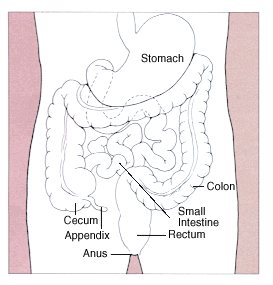10 High Risk Factors For Colon (Colorectal) Cancer
Colon cancer, or colorectal cancer, is where a malignant tumor develops in the large intestine, specifically the colon and rectum but may also include the appendix and anus. It is the third most common cancer in men and women and the second most common cause of cancer-related deaths in the United States. Colon cancer has become so much of a concern in recent times that individuals who are over 50 years of age are advised to screen for it with even the slightest change in bowel habit. However, in the early stages of colon cancer there may be no symptoms.
The more risk factors you have, the greater your risk of developing colon cancer. Even if you have experienced no change in bowel habit, routine screening may still be advisable solely based on the number of risk factors that you have. Most people are not aware of the top 10 risk factors for colon cancer. It is this lack of knowledge that contributes to delayed testing for colon cancer when symptoms arise and avoiding routine screening even without any symptoms being present.
Being Older Than 50 Years
Many diseases are more likely to develop as you get older and the same applies to colorectal cancer. The vast majority of cases are diagnosed in people over the age of 50 years. However, this does not mean that you cannot develop colorectal cancer if you are younger. Given this age predilection, it is vital that people over 50 years keep a close eye on change in bowel habit. Colon cancer will not be as obvious as bleeding from the anus. If you are 50 and considered high risk, regular screening by means of a colonoscopy is advisable every year.
Having Genetic Colon Conditions
There are several genetic conditions known as inherited polyposis syndromes that may increase your risk of colon cancer. These genes are usually inherited and can be passed on for many generations down. You may not even be aware of it. Some people develop these genetic mutations sporadically without it being inherited. These conditions include familial adenomatous polyposis, hereditary nonpolyposis colorectal cancer (HNPCC) and hamartomatous polyposis syndromes. HNPCC cases have as high as an 80% risk of colon cancer compared to around 1% for hamartomatous polyposis syndromes.
Suffering With Chronic Bowel Diseases
Bowel diseases where there is long term inflammation may be linked to colorectal cancer. The most notable is inflammatory bowel disease (IBD) like Crohn’s disease and ulcerative colitis. Both conditions have an increased risk of colorectal cancer although in the past it was believed to be only with ulcerative colitis. It is important to know that there is no colorectal cancer risk with irritable bowel syndrome (IBS). This condition is different from IBD but is often confused with one another.
Cigarette Smoking and Alcohol Consumption
Cigarette smoking is well known for increasing the risk of all types of cancer. Most people associate cigarette smoking with throat and lung cancer. However, it can also increase your risk of colon cancer. All smokers are at risk but heavy smokers are more so. Moderate alcohol use is not associated with serious health implications. However, alcohol misuse may lead to a host of disease and not just liver problems. Alcoholics have a higher risk of colon cancer but so do people who drink slightly more than is recommended for daily consumption.
Personal or Family History of Colon Cancer
Even if you overcame colon cancer previously, the fact that you did have it before means that you are at a greater risk of developing colon cancer in the future. This risk exists throughout life. However, it does not mean that you cannot beat cancer again in the future if it does arise. Always go for regular screenings to detect it early. Your risk is also greater if there is a history of family cancer, particularly if your parent, sibling or child had/has it. The more the number of family members who have/had colon cancer, the greater your risk.
Eating Too Little Fiber And Too Much Fat
Diet plays an important role in cancer risk, and more so for colon cancer since it is occurs in the digestive tract. People with a low fiber diet and those with a high fat diet are at a greater risk of colon cancer. It is also interesting to note that people who eat large amounts of red meat are at risk although the results in this regard are mixed. Therefore if you love your fatty portions of red meat with very little fruit and vegetables, then your risk is much higher. There is also evidence to suggest that smoked or cured meats are more risky than fresh meat.
Very Little Physical Activity On A Regular Basis
We often hear about the health benefits of regular exercise. However, most people think that exercise if good for preventing cardiovascular diseases and losing weight. But exercise has a wide range of health benefits. It is known that people who live a sedentary lifestyle tend to have a higher chance of developing colorectal cancer. A sedentary lifestyle is also linked to obesity, another risk factor for colon cancer. But it is not about being an avid sports person or regular workouts at the gym, just 30 minutes of exercise five times a week will suffice.
Being A Longstanding Diabetic
Diabetes mellitus is known to affect your eyes, heart and blood vessels, nerves and kidneys in the long term especially if it is poorly managed. But many people do not realize that diabetes can increase their risk of colorectal cancer. The exact mechanism is not understood but it is believed to be linked to a weakened immune system that occurs with uncontrolled diabetes. The immune system plays a vital role in protecting the body against cancers. Diabetics therefore have to be more cautious especially if they have long-standing diabetes or difficulty controlling their blood sugar levels.
Having A Weight Problem
Colon cancer is also linked to obesity. Not only do obese people have a higher risk of colon cancer, they are also more likely to have aggressive forms that lead to death. It is unclear whether it is a sedentary lifestyle and poor diet, both of which contribute to weight problems, that is responsible for this increased risk of colon cancer among obese people or whether it is the obesity itself. However, losing weight should be a priority for every person who is battling with the bulge. It is even more important if you have one or more of the other risk factors for colon cancer.
Exposure to Radiation
The risk of cancer with radiation exposure is well known. However, most people do not take it seriously as they are unlikely to come in contact with radioactive material or be exposed to radiation. There are several different types of treatment for cancer and one of it is radiation therapy. Although it can be used to treat cancer, it can also cause cancer. If you have undergone radiation therapy to the abdomen or pelvis, then you are at a higher risk of developing colorectal cancer. It is also possible that the cancer has nothing to do with radiation but that cancer elsewhere in the body has spread to the colon.







